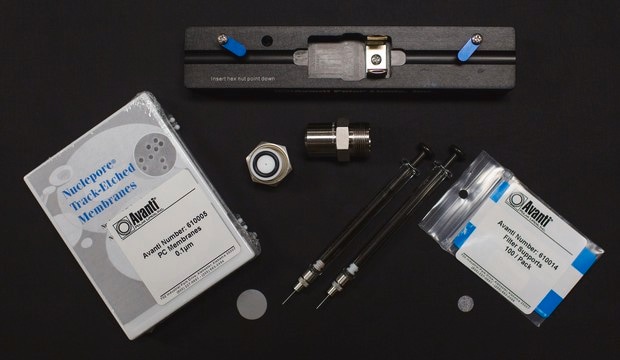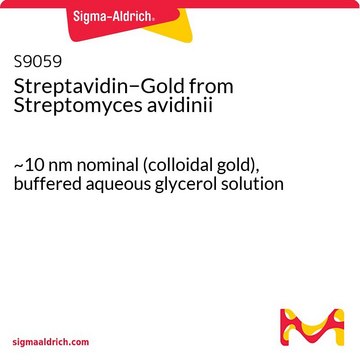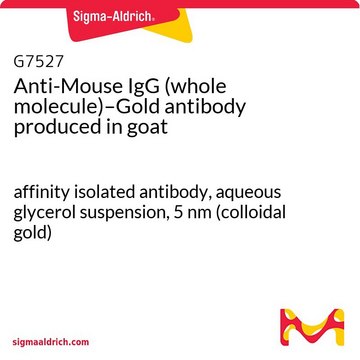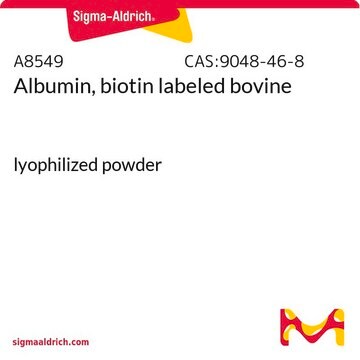P6855
Protein A–Gold
~2.5 A520 units/mL, aqueous glycerol suspension, 17-23 nm (monodisperse), 20 nm nominal (colloidal gold)
Sign Into View Organizational & Contract Pricing
All Photos(1)
About This Item
MDL number:
UNSPSC Code:
12352203
Recommended Products
conjugate
gold conjugate
form
aqueous glycerol suspension
concentration
~2.5 A520 units/mL
particle size
17-23 nm (monodisperse)
nominal
20 nm (colloidal gold)
storage temp.
2-8°C
Looking for similar products? Visit Product Comparison Guide
General description
Protein A is a 42 kD, highly stable cell surface receptor isolated from Staphylococcus aureus which binds selectively and with high affinity to the Fc portion of IgG from various species.Protein A-gold is an electron dense, non-fading marker and can be used as a probe in electron microscopy (TEM and SEM), light microscopy and blotting. Protein A - 20 nm colloidal gold reacts specifically with IgG of human.
Application
Protein A-Gold can be used in dot blot. It can also be used to detect immunoglobulins.
Other Notes
Protein A, extracellular (P 6031), adsorbed to colloidal gold.
Physical form
Suspension in 0.02 M Tris-buffered saline, containing 1% bovine serum albumin, 30% glycerol, and 15 mM sodium azide.
Disclaimer
Unless otherwise stated in our catalog or other company documentation accompanying the product(s), our products are intended for research use only and are not to be used for any other purpose, which includes but is not limited to, unauthorized commercial uses, in vitro diagnostic uses, ex vivo or in vivo therapeutic uses or any type of consumption or application to humans or animals.
Storage Class Code
10 - Combustible liquids
WGK
WGK 3
Flash Point(F)
Not applicable
Flash Point(C)
Not applicable
Choose from one of the most recent versions:
Already Own This Product?
Find documentation for the products that you have recently purchased in the Document Library.
Customers Also Viewed
Bacterial Fc receptors.
Boyle, M.D.P., and Reis, K.J.
Biotechnology, 5, 697-703 (1987)
Some physiochemical properties of protein A from Staphylococcus aureus.
I Björk et al.
European journal of biochemistry, 29(3), 579-584 (1972-09-25)
Regina Rabl et al.
The Journal of cell biology, 185(6), 1047-1063 (2009-06-17)
Crista junctions (CJs) are important for mitochondrial organization and function, but the molecular basis of their formation and architecture is obscure. We have identified and characterized a mitochondrial membrane protein in yeast, Fcj1 (formation of CJ protein 1), which is
Our team of scientists has experience in all areas of research including Life Science, Material Science, Chemical Synthesis, Chromatography, Analytical and many others.
Contact Technical Service












